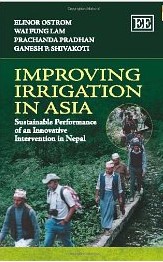|
English Summary/英文概要: The late Elinor Ostrom, formerly Senior Research Director, Workshop in Political Theory and Policy Analysis, Professor of Political Science, Indiana University, US and 2009 Winner of the Nobel Prize in Economic Sciences for research on economic governance, Wai Fung Lam, Professor of Politics and Public Administration, The University of Hong Kong, Prachanda Pradhan, Patron, Farmer Managed Irrigation Systems (FMIS) Promotion Trust, Nepal and Ganesh P. Shivakoti, Professor of Agricultural and Natural Resource Economics, Asian Institute of Technology, Thailand
‘A unique and significant longitudinal study of irrigation intervention in FMIS in Nepal that revives important debates on how irrigation management evolves and how this can be investigated. This concise and accessible book can inform and challenge agencies and donors to reflect on policies and researchers to argue further the study of collective action and political theory in irrigation management.’
– Linden Vincent, Wageningen University, The Netherlands
‘Improving Irrigation in Asia by Elinor Ostrom and colleagues is grounded in intimate detail on water management experience in Nepal while being informed by broadly-applicable concepts and behavioral theories. It greatly advances our understanding of management options and effects. As the water resources available for agriculture become more limited and unreliable, the efficiency and productivity with which irrigation water is used must be increased. While better technology can assist in this quest, the greatest potential gains lie in the social and organizational domains.’
– Norman Uphoff, Cornell University, US
‘Governance of irrigation systems is complex, needing social, technical and financial actions that support farming. Few people have as much knowledge of self-governing irrigation systems as these authors, and few countries have as many of these systems as Nepal. Lessons from these small irrigation systems can be adapted to much larger units, and to other kinds of activity. External assistance on a modest scale could generate practical benefit, by encouraging self-reliance in communities.’
– Charles Abernethy, International Irrigation Management Institute, Colombo (1987–94) and Asian Institute of Technology, Thailand (1996–99)
Improving Irrigation in Asia is based on a longitudinal study over two decades on innovative intervention for sustained performance of irrigation systems. The work identifies key factors that can help explain the performance of interventions, and explicates lessons for resource management and the management of development assistance.
In 1985, the Water and Energy Commission Secretariat of Nepal and the International Irrigation Management Institute developed an ingenious intervention program for nineteen irrigation systems located in the middle hills of Nepal in an attempt to overcome the prevailing ‘best-practices’ traps, in regard to assisting irrigation systems. This book highlights the innovativeness of the project lay in its provision of ample opportunities for farmers to make decisions regarding the operation of the irrigation system based on their local knowledge and creativity. The authors of this work, Elinor Ostrom, Wai Fung Lam, Prachanda Pradhan and Ganesh P. Shivakoti provide detailed analysis of these interventions and support the conclusion that farmers can build on an innovative intervention that not only provides physical improvements but also enhances farmers’ problem-solving capacity. They argue that to achieve sustainable improvements in performance, the farmers themselves need to engage in collective action over time and support local entrepreneurs who provide leadership and stimulate adjustments to change.
Providing practical policy solutions, this study will prove a fascinating and invaluable read for academics and scholars of development studies, resource management, and irrigation studies, as well as development specialists in international agencies, policymakers in governments and international donor agencies.
Chinese Summary/中文概要: 《提高亚洲的灌溉水平》基于对灌溉系统的可持续新型干预的20年深度研究。这一研究揭示了干预效果的关键因素,并阐述了资源管理和发展援助的管理经验。
1985年,尼泊尔水与能源委员会秘书处和国际灌溉管理研究所为克服普遍的“最佳实践”陷阱,在19个尼泊尔中部丘陵地带的灌溉系统开发了关于协助灌溉系统灵活干预计划。这本书突出了该项目的创新性,基于农民对当地知识和创造力进行灌溉系统的操作,为他们提供足够机会做决定。本书作者Elinor Ostrom, Wai Fung Lam, Prachanda Pradhan 和Ganesh P. Shivakoti对这些干预提供了详细的分析,支持农民能够建立新型干预的结论,不仅提供了对物质的改造,也提高了农民的问题解决能力。作者主张达到实际应用中的持续改善,需要农民们通过长时间的集体行动,并支持当地组织领导和鼓励结构调整的企业家。这项研究提供了切实的政策解决方案,为进行发展研究、资源管理和灌溉研究的学术机构和学者们,以及国际机构发展专家,政府和国际捐助机构的政策制定者们提供了极佳的宝贵读物。(Pêche)
Awards/获奖情况: “这是一个对尼泊尔农民管理灌溉的干预系统的独特重要的深度研究,这一研究再次引起了关于如何发展灌溉管理和怎样调查研究的重要辩论。这本简明易懂的书可以向机构和捐助者发出通知、提出挑战,让政策和研究人员的反思,对集体行动和灌溉管理的政治理论的研究进行进一步讨论。”——荷兰瓦赫宁根大学Linden Vincent
“Elinor Ostrom和同事们共同完成的《提高亚洲的灌溉水平》建立在详细的尼泊尔水资源管理经验之上,同时适用于普遍思想和行为理论。它极大地提高了我们对管理选项和影响的理解。由于用于农业水资源日趋紧张和不可靠,灌溉用水的效率和生产率必须提高。在社会和组织领域的最大潜在收益可以通过更好的技术协助这一任务,。”——美国康奈尔大学Norman Uphoff
“管理灌溉系统是复杂的,需要社会、技术和财政对农业的支持。很少有人像这些作者一样了解这么多的灌溉系统自我管理的知识,几乎没有国家像尼泊尔一样有这么多的灌溉系统。从这些小型灌溉系统总结的经验教训可以运用到更大的地域,以及其他种类的活动。通过鼓励社区自我管理,适度的外部援助就能产生实际的效益。”——科伦坡国际灌溉管理研究所(1987 - 94),和泰国(1996 - 99)亚洲技术研究所, Charles Abernethy
|

|
About the Author/作者介绍: Elinor Ostrom, Senior Research Director, Workshop in Political Theory and Policy Analysis, Professor of Political Science, Indiana University, US and 2009 Winner of the Nobel Prize in Economic Sciences for research on economic governance, Wai Fung Lam, Professor of Politics and Public Administration, The University of Hong Kong, Prachanda Pradhan, Patron, Farmer Managed Irrigation Systems (FMIS) Promotion Trust, Nepal and Ganesh P. Shivakoti, Professor of Agricultural and Natural Resource Economics, Asian Institute of Technology, Thailand
Elinor Ostrom在政治理论分析与政策研讨会担任高级研究主任,美国印第安那大学政治学教授,对经济治理的研究获得了2009诺贝尔奖经济学奖。
Wai Fung Lam,香港大学政治与公共行政学教授。
Prachanda Pradhan,尼泊尔农民灌溉系统管理(FMIS)信托赞助人。
Ganesh P. shivakoti,泰国亚洲技术研究所农业和自然资源经济学教授。
|


